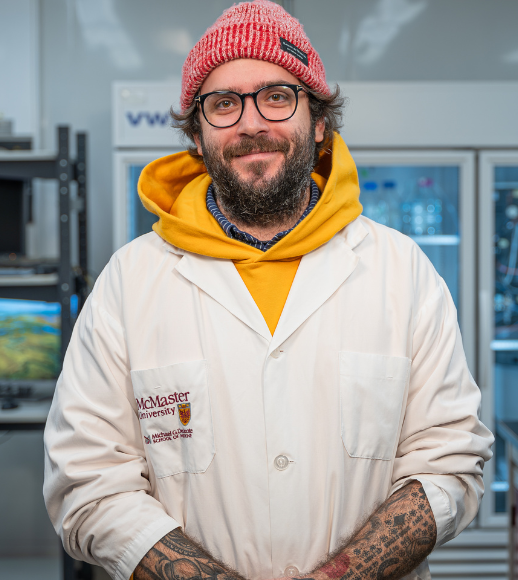Jonathan Stokes – 2024 Feature Grant Recipient
Generously funded by Donors of Brain Tumour Foundation of Canada
 Jonathan Stokes – McMaster University – Hamilton, ON
Jonathan Stokes – McMaster University – Hamilton, ON
Project Title: “Generative AI for Novel drug design against recurrent glioblastoma”
Description of Project:
Adult brain tumors present a critical need for innovative therapeutic approaches, given the inadequacies of current treatments in achieving curative outcomes and providing limited survival benefits. About 1,000-1,500 Canadians are diagnosed with glioblastoma (GBM) every year, the most common and most lethal primary malignant brain tumor in adults. Despite aggressive multi-modal treatment, patients invariably relapse (recurrent GBM; rGBM) within only months post-diagnosis, resulting in a dismal prognosis of less than 15 months. Moreover, even after hundreds of clinical trials, there has been little progress over the past two decades.
Excitingly, contemporary artificial intelligence (AI) methods present a promising avenue to address the previous challenges associated with developing medicines to treat rGBM, due to their ability to explore truly vast chemical spaces in silico for novel molecules with the desired properties. In this project, we will leverage purpose-curated training datasets to train and deploy state-of-the-art generative AI algorithms that can design novel small molecule therapeutics against rGBM. Our novel AI-generated molecules will then be tested in the wet lab to validate their targeted anti-rGBM activity. This innovative project holds significant promise to improve quality of life for patients with rGBM and transform the paradigm of drug discovery in this challenging space.
What receiving this award means:
Through their remarkable generosity, the Brain Tumour Foundation of Canada has enabled our interdisciplinary research group to develop artificial intelligence technologies to help discover new therapies against recurrent glioblastoma. This work is challenging, but immeasurably high reward, and I am deeply grateful for the long-term vision of the BTFC in supporting this work at the edge of what is currently possible. I look forward to working with everyone at the BTFC to develop leading-edge artificial intelligence methods that can enable us to more rapidly invent new drugs to help patients.